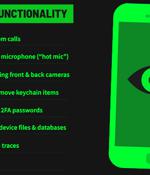Security News

Cybersecurity firm Kaspersky has released a tool to detect if Apple iPhones and other iOS devices are infected with a new 'Triangulation' malware. Although the malware analysis is still underway, the cybersecurity firm noted that the 'Operation Triangulation' malware campaign uses an unknown zero-day exploit on iMessage to perform code execution without user interaction and elevated privileges.

Russian intelligence has accused American snoops and Apple of working together to backdoor iPhones to spy on "Thousands" of diplomats worldwide. A Kaspersky spokesperson told The Register it's aware of the FSB claims, but can't say if the two things - Uncle Sam backdooring iPhones, and the spyware found on several Kaspersky devices - are linked.

Russian cybersecurity firm Kaspersky says some iPhones on its network were hacked using an iOS vulnerability that installed malware via iMessage zero-click exploits. Kaspersky says the campaign started in 2019 and reports the attacks are still ongoing.

Today, the U.S. Cybersecurity & Infrastructure Security Agency ordered federal agencies to address three recently patched zero-day flaws affecting iPhones, Macs, and iPads known to be exploited in attacks. iPhone 6s, iPhone 7, iPhone SE, iPad Air 2, iPad mini, iPod touch, and iPhone 8 and later.

Apple has addressed three new zero-day vulnerabilities exploited in attacks to hack into iPhones, Macs, and iPads. Apple addressed the three zero-days in macOS Ventura 13.4, iOS and iPadOS 16.5, tvOS 16.5, watchOS 9.5, and Safari 16.5 with improved bounds checks, input validation, and memory management.

A Microsoft app that helps people use their Windows PC and iPhone or Android phone in tandem could also be abused by cyberstalkers to snoop on personal information. In a report released Thursday, software maker Certo explains how Microsoft's Phone Link app could be used against iPhone owners and how they can protect themselves against this type of threat.

Apple has launched the first Rapid Security Response patches for iOS 16.4.1 and macOS 13.3.1 devices, with some users having issues installing them on their iPhones. As the company describes in a recently published support document, RSR patches are small-sized updates that target the iPhone, iPad, and Mac platforms and patch security issues between major software updates.

Apple introduced the optional recovery key in 2020 to protect users from online hackers. iPhone thieves with your passcode can flip on the recovery key and lock you out.

Israeli spyware maker NSO Group deployed at least three novel "Zero-click" exploits against iPhones in 2022 to infiltrate defenses erected by Apple and deploy Pegasus, according to the latest findings from Citizen Lab. "NSO Group customers widely deployed at least three iOS 15 and iOS 16 zero-click exploit chains against civil society targets around the world," the interdisciplinary laboratory based at the University of Toronto said.

It's also suspected that the company abused a zero-click exploit dubbed ENDOFDAYS in iOS 14 to deploy spyware as a zero-day in version 14.4 and 14.4.2. While QuaDream is not directly involved in targeting, it is known to sell its "Exploitation services and malware" to government customers, the tech giant assessed with high confidence.